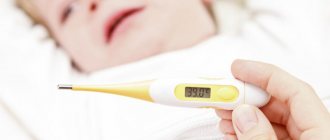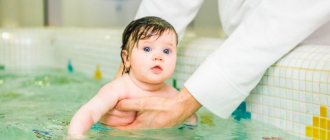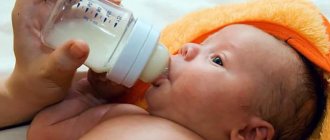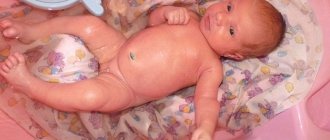Premature babies: signs
There are four degrees of prematurity:
- First. The baby was born at 37 weeks of pregnancy, is 45 centimeters tall and weighs more than two kilograms.
- Second. The child was born at 35 weeks, is 40 centimeters tall and weighs less than two kilograms.
- Third. The baby was born at 31 weeks, measuring up to 35 centimeters and weighing up to one and a half kilograms.
- Fourth. The baby was born at 28 weeks, his height does not exceed 30 centimeters, and his weight is less than one kilogram.
Sometimes the child appears on time, but his body weight does not reach normal. Such a child is also considered premature. The following features will distinguish him from ordinary children:
- slower reaction;
- hypertonicity and hypotonicity;
- lack of pigmentation in the nipple area;
- underdevelopment of the genital organs;
- hypotension;
- frequent breaths and freezing of breath;
- perpendicular arrangement of ribs;
- roundness of the abdomen;
- location of the navel in the groin area;
- underdevelopment of nail plates;
- disproportionate head sizes;
- softness of the skull bones;
- insufficient thermoregulation;
- underdevelopment of the ears;
- a thin layer of subcutaneous fat;
- skin wrinkling;
- quiet voice;
- pink or red skin tone;
- presence of hair fluff.
The presence and severity of these signs depends on the specific week of birth of the baby.
Premature babies: reasons
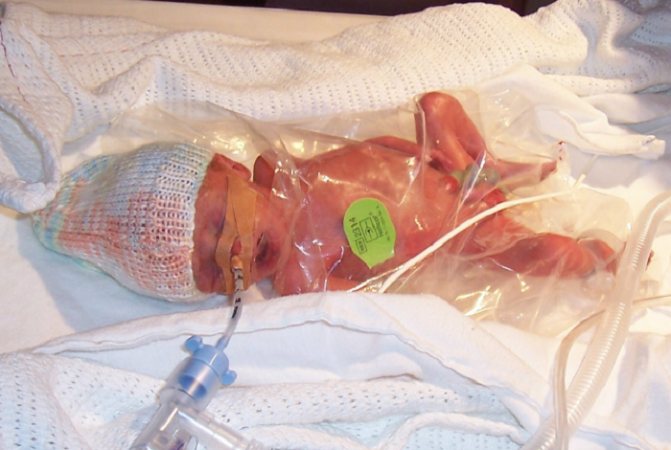
The birth of a baby at the wrong time is caused by many reasons. Firstly, the reason for this is the mother’s illnesses: rheumatism, diabetes, heart disease and some others.
Secondly, premature babies are born to women who were not registered at the antenatal clinic; became pregnant earlier than two years have passed since the previous pregnancy; have had abortions in the past; have diseases of the genitourinary system.
Thirdly, premature birth occurs due to the mother’s age being too early or late, poor nutrition, stressful situations, and reluctance to have a child.
Other prepositions can also be distinguished:
- difficult pregnancy;
- heredity;
- non-compliance with the recommendations of the gynecologist;
- bad habits;
- acute mental shocks;
- carrying twins or triplets;
- presence of harmful factors in the workplace;
- negligence of a pregnant woman;
- fertilization with weak or immature sperm.
Every woman has the power to minimize the risk of having a premature baby. To do this, you should give up bad habits long before the desired pregnancy, lead a healthy lifestyle, get rid of existing ailments, protect yourself from stressful situations, get more positive emotions, and follow the instructions of doctors.
Prognosis for the child
Children born prematurely require special care from doctors and parents. Proper care and competent medical care helps such babies quickly adapt to environmental conditions and become full-fledged and healthy members of society. The situation is a little different with children with severe prematurity.
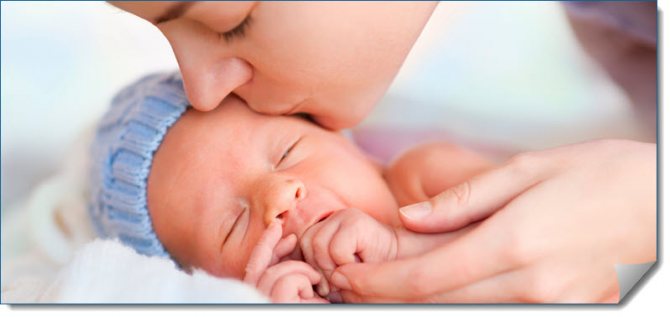
Often such children die or remain with developmental defects for life. This is why it is so important for a pregnant woman to follow the rules for preventing premature birth.
You might be interested in reading about how much milk a newborn should eat. All the necessary information is in one of our articles.
Premature babies: consequences
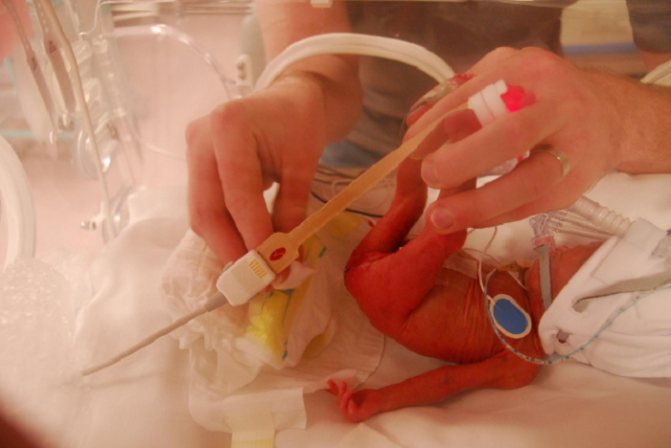
If the baby's weight is insufficient at birth, he will be able to return to normal by one or two years. As for mental development, it will become equal to the level of peers at two to three years old, and sometimes at five to six years old. It all depends on the degree of prematurity, the individual characteristics of the child, the care of the parents and the implementation of special procedures.
However, early birth causes a number of consequences for a person in the future:
- instability of a woman’s menstruation, difficult pregnancy, premature birth;
- dislocations and subluxations, dysplasia, joint diseases;
- seizures, cerebral palsy and other disorders in the functioning of the nervous system;
- VSD;
- reduced immunity, poor health, susceptibility to frequent colds;
- hearing problems;
- poor eyesight;
- diseases of the gastrointestinal tract;
- speech difficulties;
- high risk of cardiovascular diseases.
Due to the high probability of severe consequences, premature babies should be under regular medical supervision and undergo the necessary examinations not only during childhood, but also in adulthood.
Thus, children born prematurely do not necessarily grow up weak and sickly, lagging behind normal babies in psycho-physical development. However, their risk of developing various ailments is much higher than that of others. Therefore, parents should pay more attention to their premature babies, take care of them, perform the exercises recommended by doctors and follow their advice. It is also important to constantly be under medical supervision in order to be able to identify serious diseases in time and begin to fight them.
Differences between premature babies and babies born at term
It cannot be said that there is any clear classification of prematurity in babies. The degree can be determined by a doctor depending on many aspects. Below are the characteristics of babies born earlier than planned.
Nervous system
The central nervous system plays a very important role in the functioning of all human organs. In newborns, it provides reflexes such as sucking, swallowing, grasping and others. If the central nervous system is underdeveloped, nerve impulses to the brain travel more slowly in these infants.
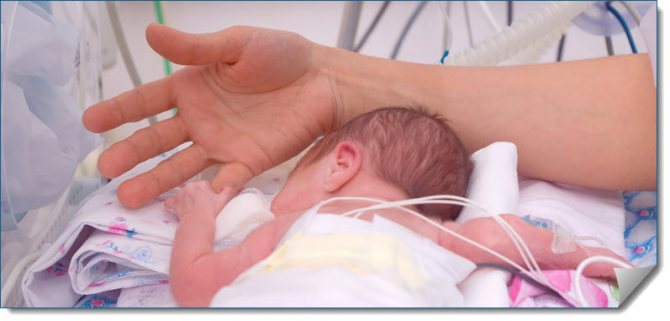
It sometimes takes up to 24 months for the nervous system to fully mature. By this return, premature babies, as a rule, catch up with their peers in mental and physical development.
Violation of thermoregulation
The earlier the toddler was born, the worse his heat exchange is developed. As a result of such a violation, the baby may become hypothermic or, conversely, overheat at normal temperatures. This condition is explained by the fact that the thermoregulation center in the brain is still immature, and there is an insufficient layer of fat under the skin. By the age of one year, thermoregulation improves.
Digestive system dysfunction
Due to decreased peristalsis of the stomach and intestines, as well as insufficient production of food enzymes, the baby may experience symptoms such as frequent intestinal colic, regurgitation, flatulence, and more.
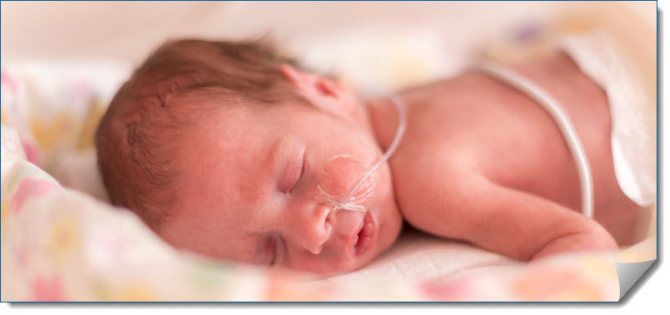
In addition, there are often problems with the absorption of essential components such as fats, proteins, vitamins and others.
Lack of maturity of the respiratory system
Babies born prematurely often suffer from various respiratory problems. The diaphragm in such babies is located high, and narrowing in the area of the bronchi and trachea is often observed. The oxygen supply to the body is impaired due to the fact that the newborn breathes shallowly and frequently. Oxygen starvation, in turn, leads to various complications, in particular, iron deficiency anemia.
Immaturity of the pancreas
Due to poor functioning of this organ, the child's blood glucose levels may decrease. This is a dangerous condition that can cause severe pathology such as epilepsy or mental retardation.
1246847579
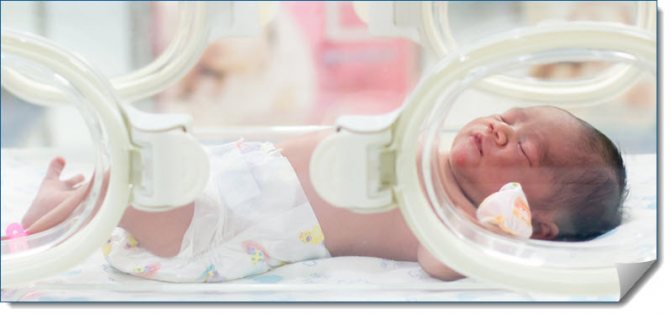
This is why it is so important to control the blood sugar levels of babies born prematurely.
Weakness of immunity
Due to weakened natural defenses of the body, a child may suffer from viral, fungal and bacterial infections. Often these babies are diagnosed with allergies.
Proper care of premature babies - features and subtleties
Babies who were born prematurely need special care. This applies not only to medical care in the first weeks of life, but also to further stay at home. However, parents should not panic, imagining incredibly complex and specific manipulations. In fact, all parents can provide proper care for premature babies, the features and subtleties of which are described below.
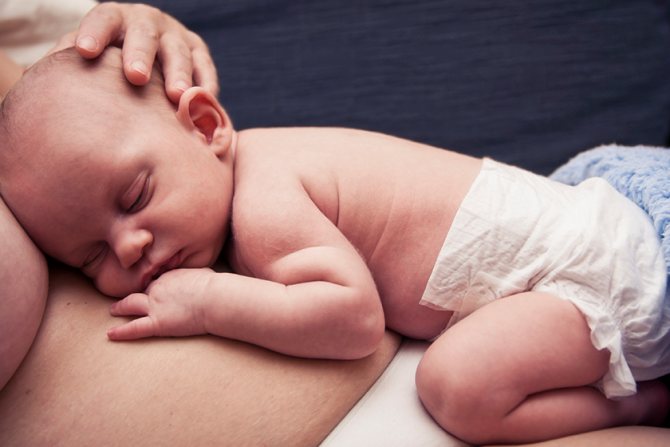
All attention to the temperature regime!
As soon as the baby and mother get home from the hospital, the first thing they have to take care of is maintaining the optimal temperature regime. Due to their low weight and insufficient fat layer, premature babies especially need warmth.
In this matter, pediatricians recommend adhering to the following rules:
- The temperature in the room where the child will be located is from 22 to 25 degrees.
- Near the baby and under his blanket, parents should constantly maintain the temperature in the aisles from 28 to 32 degrees. Rubber heating pads filled with water at a temperature of 60-65 degrees can help in this difficult matter. It is strictly forbidden to use electric heating pads, blankets and other similar products.
- The heating pads are placed on top of the blanket on the sides, at a distance of a palm from the baby, and also at his feet. In this case, such a heat source is pre-wrapped in a diaper. It is prohibited to place heating pads on top of or under the baby, as this can lead to burns and breathing problems.
- Monitor temperature using a thermometer. The regularity of changing water in heating pads is 1.5-2 hours.
- Ventilation of the room in which the child is staying is carried out every 3 hours and lasts at least 20 minutes.
Important! A premature baby should not be left without warmth even for a couple of minutes, as this immediately threatens hypothermia. Parents will need to adhere to such a strict temperature regime for the first month of the baby’s life, after which he will be able to cope with external changes on his own.
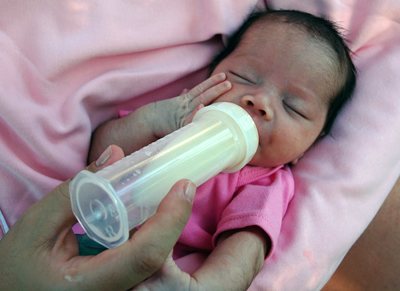
How to organize feeding?
The biggest problem that parents of a premature baby will have to face is related to the child's insufficient or complete absence of sucking reflex. Also, such children are characterized by poor appetite, constant regurgitation, constipation or, on the contrary, diarrhea. All this is due to the immaturity of the gastrointestinal tract.
That is why pediatricians recommend using the following rules in relation to premature babies:
- Provide breastfeeding to the baby. A young mother should think about maintaining lactation while still in the maternity hospital. Good nutrition, lack of stress and good sleep of a woman will provide the baby born prematurely with the most necessary things.
- To prevent the baby from burping after the next meal, it should be done often and in small quantities, reclining. After this, the child should remain in an upright position for 15-20 minutes.
- In case of unstable stool or other problems with the digestive system, it is strictly not recommended to use tummy massage, gas outlet devices (tubes) and enemas.
Important! If problems with the gastrointestinal tract occur too often, accompanied by alarming symptoms, then you should immediately consult a specialist.
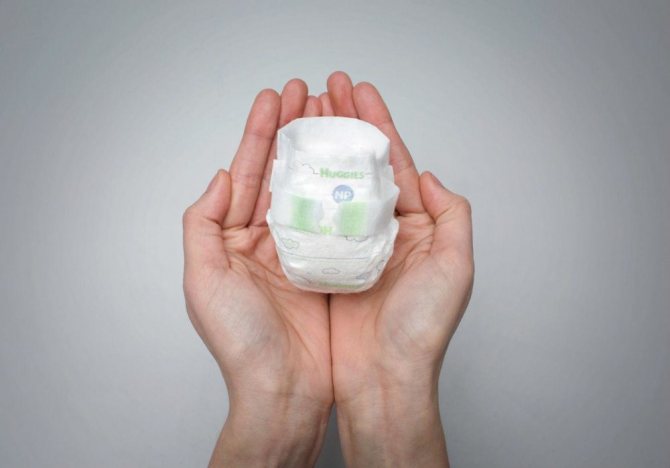
First water procedures - what should they be?
If the baby was born weighing no more than 1800 g, then you will have to give up bathing for 2-3 weeks. Children with greater weight enjoy water procedures already in the first week after arriving from the hospital.
When bathing babies born prematurely, be sure to adhere to the following recommendations:
- Before reaching 3 months, babies should bathe in pre-boiled water, the temperature of which is 38 degrees.
- The room where the procedures will be carried out should be heated to 25 degrees.
- After bathing, you should not immediately transfer the baby to a room with a lower air temperature. Over time, the bathroom door can be left open so that the child can gradually adapt to the new environment.
It is precisely these hygienic procedures that consist of proper care for premature babies, the features and subtleties of which all parents can learn.
Massage – is it possible or not?
Of course, for premature babies, experts have developed special massages and procedures that will help the baby get stronger and master the necessary skills as quickly as possible.
There are some peculiarities in dealing with such babies:
- If a child has muscle hypotonia, then light stroking is suitable for him, which delicately relaxes the muscles.
- After two months of age, such simple manipulations can be varied with light gymnastic exercises. They will help you quickly develop and consolidate motor skills.
- If the baby is already 3-4 months old, then parents can already teach him to turn to his side. The main thing is to do everything carefully and slowly.
Important! The main goal of massage for premature babies is psycho-emotional contact with parents, during which they gain positive emotions and new skills.
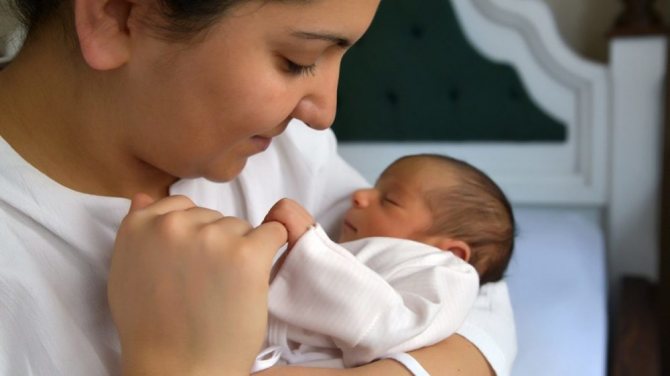
Let's go for a walk - how to make it safe and useful?
As mentioned earlier, temperature changes are contraindicated for premature babies. If you want to go with your dear child into the fresh air as soon as possible, then you will need to follow the following rules:
- The first walk for babies weighing more than 1500 g will take place no earlier than two weeks of age. And this is only provided that it is summer outside and the air temperature is from 26 degrees.
- Going outdoors should begin with 15 minutes of exposure to the open air. Then, gradually adding 20 minutes at a time, the total time reaches 1.5 hours.
- As soon as the child reaches a weight of 2500 g or 1.5 months, he can be taken for walks without fear in the spring-autumn period, when the temperature outside is at least 10 degrees.
- If the mark on the thermometer drops below 8, then they refuse to go for walks. The exception is babies weighing from 2800 g and older than 2 months.
Features of the development of premature babies by month
Children born prematurely should be under close medical supervision. This is due to the fact that such newborns develop slightly differently than their peers. The monthly development pattern is as follows:
- First. All internal organs and systems of the baby undergo adaptation to the environment in the first four weeks of life. The baby is still weak, his sucking activity is rather weak, and weight gain is slow. After discharge from the maternity hospital, parents should closely monitor the baby and try to protect him from infectious diseases.
- Second. Weight gain accelerates, motor and sucking activity increases. This can be considered a sign that the newborn is getting stronger and on the mend. From the second month, tummy tucks and light massage are allowed.
- Third. At this age, the first grimaces appear. The baby begins to learn to focus on her mother, raises her head, and responds to the touches of loved ones with the help of facial expressions. By three months, the grasping reflex is noticeable. Weight is gaining well. All that the child needs now is care, protection and provision of the right conditions.
- Fourth. The toddler begins to hold his head and makes his first sounds. Regular massage and gymnastics help reduce muscle tone, which is still quite high at this time.
- Fifth. Around the fifth month, the baby pleases mom and dad with his first smile. His interest in the world and objects around him noticeably increases. If the baby hears a sound, he looks in that direction and tries to turn his head.
- Sixth. By the age of six months, toddlers learn to roll over from their tummy to their back and vice versa. The baby already recognizes its relatives well; the so-called “revival complex” appears. Seeing her relatives, the baby waves her arms and legs and smiles.
- Seventh. By this time, the first teeth have already appeared. The baby confidently holds the rattle, smiles, and tries to crawl. All reflexes are quite pronounced.
- Eighth. Now the little one confidently stands on all fours, sways from side to side, turns his head. The desire to communicate with dad, mom and other close people is quite strong. Children of this age love fairy tales, poems, songs and nursery rhymes.
- Ninth. By the age of nine months, the child pronounces the first syllables - “boo-boo”, “ma-ma”, “la-la”. Now the baby is already crawling well or is actively trying to do so. Communication with adults becomes even more active.
- Tenth. The baby stands confidently at the support and can take several side steps near it. Favorite activity is making promises with adults and watching bright objects move.
- Eleventh. By this time, children already know how to sit, stand, take steps near a support, or even independently. Most of the time the toddler crawls. Communication with parents and other loved ones becomes a necessary necessity of life.
- Twelfth. By the age of one, many babies born prematurely take their first steps. At the same time, mental development is slightly delayed and this is considered the norm. If your baby hasn't taken his first steps yet, don't worry. A little more time and effort, and he will definitely succeed.
You might be interested in: Rules of etiquette and good manners for a child
You shouldn’t look for various deviations in your baby and get upset if something doesn’t work out for him. During a routine examination, the pediatrician will definitely pay attention if something goes wrong.
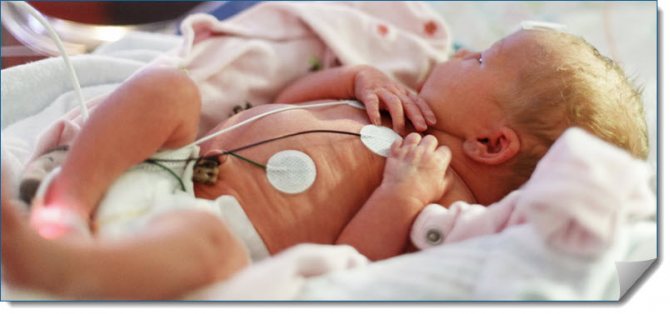
If various alarming signs appear, for example, if the baby stares at the ceiling for a long time, avoids eye contact, or shows aggression, you should definitely inform your doctor about this.
Under close medical supervision – which specialists should examine the child?
Before reaching school age, premature babies are monitored at the dispensary. For such children, regular visits to the following highly specialized specialists are mandatory:
- Neuropathologist. As a rule, by the age of one year such children almost completely catch up with their peers in development. But, if there are any problems, only a specialist will be able to diagnose them at an early stage and prescribe effective therapy.
- Cardiologist. In addition to consulting a specialist, you will need to regularly undergo ECHO-CG procedures, as well as ECG, which allow you to assess the state of the child’s cardiovascular system.
- As soon as the baby turns 2 weeks old, he will be prescribed vitamin D and a special massage to avoid the development of rickets.
If at first glance everything seems complicated, then after a week of such a specific regime, parents will not even notice their fatigue. After all, every loving mother understands that proper care for premature babies, the features and subtleties of which are described above, will help the precious child grow up healthy and happy!
Temperature norms for newborns
Thermoregulation in newborns is imperfect; they quickly overheat and cool down just as quickly. For a newborn, a body temperature of 36.5 to 37.5 degrees in the armpit is considered normal.
If the thermal chain in the maternity hospital is not followed, the baby can easily freeze. The temperature in this case can drop to 36.0 degrees.
On days 2-4, many children may experience a temporary increase in body temperature to 38.0-38.5 degrees - so-called transient hyperthermia. It is observed, as a rule, against the background of maximum loss of body weight. No treatment is required, but breastfeeding should be established as soon as possible.
At the end of the neonatal period (1 month after birth), a body temperature of 36.5-37 degrees in the armpit is considered normal.
In the rectum, the normal temperature in a baby is 36.9-38.0 degrees, in the mouth - 36.6-37.2 degrees.
How to measure a baby's temperature?
General rules
Regardless of the method of measuring temperature, the following rules must be observed:
- the child should be in a calm state
- Before measuring the temperature, the child should be undressed and allowed to lie naked for a couple of minutes
- do not take the temperature immediately after the baby comes off the breast or immediately after crying
In infants, the temperature can be measured under the armpit, in the inguinal fold, in the rectum, in the ear, on the skin of the forehead. Measuring body temperature in the mouth of infants is not recommended.
There are various thermometers that can be used on infants. They all have advantages and disadvantages.
Mercury thermometer
When measuring the temperature under the arm, you need to immerse the tip of the thermometer as deeply as possible into the hole. To measure your child’s temperature as accurately as possible, you should firmly press his hand to his body. The result will be ready in 7-10 minutes. The temperature in the inguinal fold is measured in the same way.
When measuring the temperature in the rectum, you need to lubricate the tip of the thermometer with Vaseline or baby cream and insert it rectally for 1-2 cm. It is better to lay the child on his back, bend his legs at the knees and raise him. You can also lay him on his stomach or side. Rectal temperature is more accurate. But the procedure itself is not very pleasant for the child. If the child has not had a bowel movement for a long time, the measurements may be inaccurate.
Advantages: one of the most accurate methods, low price, simple, easy to use, easy to disinfect.
Disadvantages: glass flask, mercury content, duration of procedure, difficulty of disposal.
Digital Thermometer
It is used in the same way as a mercury thermometer, but takes less time, from 3 to 5 minutes. Many thermometers need to be held for another 1-2 minutes after the sound alert appears. When measuring rectal temperature, an electronic thermometer is preferable as it is safer.
Advantages: simple and easy to use, safe, convenient to store.
Disadvantages: not as accurate as mercury (the error can reach 1 degree), it runs on batteries, which can fail at any time.
Pacifier thermometer
They have a sensor installed for measuring temperature, and there is a display on which the result of the temperature measurement is displayed. After a few minutes of sucking on such a pacifier, it emits a beep. The value of the last measurement is stored in the device memory.
Advantages: simple and reliable method, the child does not experience negative feelings.
Disadvantages: not suitable for children who do not know what a pacifier is, high cost
Thermal strips
Thermal strips for measuring temperature are applied to the skin of the child's forehead for 10-15 seconds, and the crystals on the strip begin to change color under the influence of heat. They can only indicate whether the child has an elevated body temperature or not.
Advantages: quickly measures temperature, convenient on the road, can be used while sleeping, does not break.
Disadvantages: very inaccurate method.



